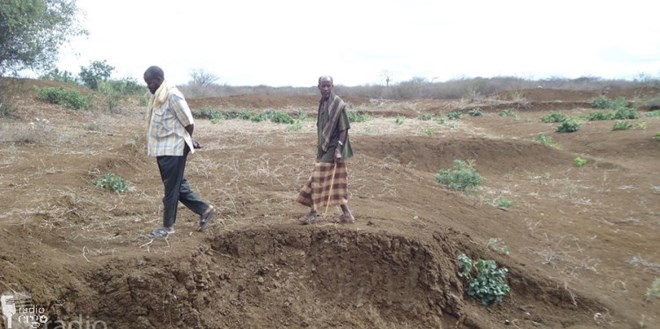
Tuesday October 25, 2022

Mohamed Hassan Ali, who owns a farm of three hectares in Gidheys, 10 kilometres from Adado in central Somalia’s Galgadud region, used to grow watermelons, beans, sorghum, and maize. However, with a family of 12 to support, he has not made any income from his farm in the last two years.
Even if the expected ‘deyr’ rainfall comes to his area soon, he has no money now to buy any seeds to plant.
“This year if we don’t get any help, it will be hard to do anything ourselves. We don’t have seeds or money. I can’t take loans as I haven’t repaid the previous loans. We don’t have any hope and it has been stressing me out,” he told Radio Ergo.
Mohamed has been a farmer for 40 years and says he has never encountered such a long dry spell on his farm. He has already been bailed out by relatives after losing his last round of crops. He sold eight of his 50 goats to clear some of his debts but still owes a lot of money.
“I took $500 from one person, and there is another who gave me $750. The people are always nagging me to repay their money. I remind them I’ve incurred losses and my farm hasn’t produced anything,” he noted.
A further challenge has been the sand blowing across the fields and burying the perimeter fence on his farm making it vulnerable to foraging livestock.
Elsewhere in Mudug facing a similar situation of crisis is Asho Mohamed Warsame, 58, and her family of 12 people, who depend on their five-hectare farm in Amaara, 200 kilometres south-east of Galkayo.
Asho has sewn seeds including sesame, watermelons, tomatoes, papaya, beans, and maize, but each time they failed due to severe water shortage.
“We have been living on credit and we have been asked to repay. We have not paid anything because we don’t have anything!” she said.
Asho used to support the education of six of her children from the farm income. Fortunately the school has allowed her children to continue their education despite her inability to pay the fees.
She told Radio Ergo that she used to earn an average gross income of $2,300 from her farm. Now she is working in a slaughterhouse earning $4-5 a day that just takes care of their food as well as milk for her elderly mother.
Her husband, who was diagnosed with tuberculosis last year, does not work. She hopes one day their farm will be productive again.
The chairman of Asal farmers association, Said Abdi Ahmed, said the 1,000 Galgadud families represented by their group are all struggling to buy seeds. A sack of bean seeds, one of the most common crops in Galgadud, has shot up to $95 from $36 last year. He added that the lack of training in farming skills has also contributed to crop failure.
“Every year the farmers buy seeds before the rainy season begins and it’s possible that the rainfall is short and less than expected which therefore leads to crop failure. This has happened before,” he explained.
Said pointed out that they reported the challenges including high price of seeds to the agriculture ministry and other organisations working in agriculture but have received no assistance.